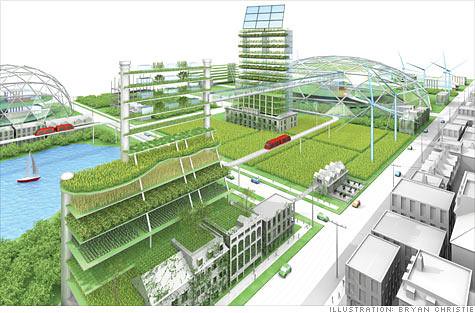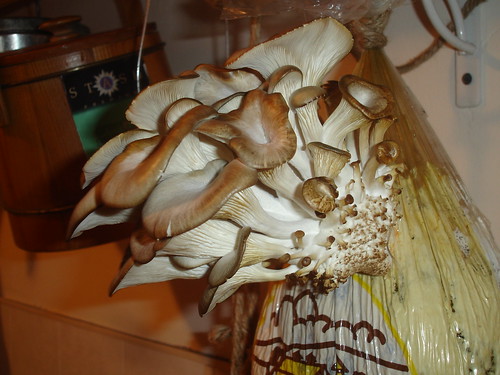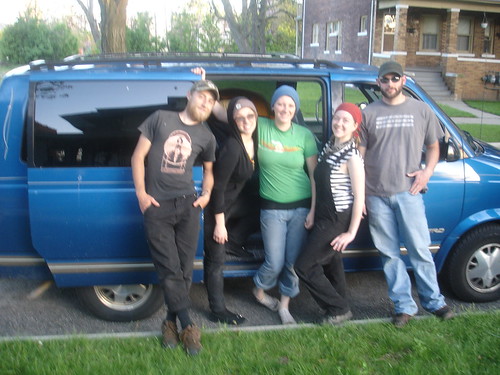This is an article that I submitted to conspire for the spring issue about place, but it didn't quite make the cut. I'm not sure if this was the final draft that I submitted or not, just was in my google documents so I figured someone should read it. comment with thoughts if you like. situations are different now then in the winter, but thats ok. enjoy...
Looking out my window, I see a blanket of snow covering the lawn, the apple tree, the gardens, and the cars out front. I'm sure that it's covering the many burned out houses, empty storefronts, and the abandoned school in the neighborhood as well. It's winter here in Detroit, which for me is a time of sharing meals and stories with friends in our living room, reflecting on the last year and filling my head with new dreams for what is to come. This year will be I'll be getting settled in a new neighborhood. It will be my sixth new address (and zip code) in as many years. That seems somewhat ironic for someone who's grown to value fidelity to people and place over almost any other thing. Perhaps more challenging, I'll be living in yet another temporary living situation. There is tension in my soul between relocating to learn and experience new things and rooting myself to make a lasting covenant with a people and a place. For the most part, I have tried to be purposeful in my choices to travel. I left Michigan six years ago to do internships and live in different communities. I've met so many amazing people and learned so many important lessons and skills. This has also helped me avoid the debt that enslaved many of my peers that have pursued a full college education. The people that I have met and the places I've been on my pilgrimage thus far have completely reshaped my perspective and allowed me to see the place where I was raised in a new light. There are always more life lessons to be learned, more places to see, once in a life time adventures to be had, and more people to meet. While this line of thinking contains much truth, there is a certain insatiable quality that reflects the consumer culture in which we live. As William Cavanaugh notes in his book Being Consumed, consumerism is less about an irrational attachment to material things (read people and place!), and more of a detachment from anything and everything. There is a certain addictive thrill and intrigue that comes from whatever is newer, bigger, better, smarter, and sexier. It allows us to consume goods, people, and places without ever asking what they may require of us. I've yet to find a ten step program to help me break free from this addiction. Fidelity may be one of the most meaningful and affective forms of cultural resistance against consumer culture.
In her book Scripture, Culture, and Agriculture, Old Testament theologian Ellen Davis explores the Hebrew Bible's concept of nachalah (נַחֲלָה). The word is often used to describe the land inherited from a previous generation, and is most likely rooted in the Exodus story. The Hebrew people were to understand the land as belonging to God, and it was to be passed from generation to generation. This is an agrarian imagination, which contrasts greatly with the imperial agriculture of ancient Egypt and the industrial agriculture of our day. There is a certain quality to this understanding that exposes the folly in a way of life based on extraction, rather than observing the delicate cycles of nature where soil is a graveyard and a continual site of resurrection. All of Creation is a complex cycling of the elements that sustain life. Death for one becomes food for another and life continues. Our lives and the life of the earth itself rely on our willingness to obey and participate in this cycle, or else the nachalah received by the next generation will be a curse rather than a blessing. We inherit the gift of land, but also the responsibility that comes with that continuity.
During my time in Camden I designed a medicinal herb garden in an abandoned lot that I hoped could heal our bodies, and perhaps the brokenness of spirit. The overgrown lot was situated in an area surrounded by drugs and prostitution. The garden seemed like it would add some color and solace to the chaos all around. It seemed a simple task. All I would do was build a few irregularly shaped raised beds and plant the herbs that I had started in the greenhouse a month or two earlier. I soon found that the soil was too polluted to grow anything in, so I decided to dig out much of the soil and put in a barrier to prevent the roots from making contact with the polluted soil below. After getting nowhere with a shovel, a generous neighbor lent me a pick ax. It would be weeks of long days in the sun until I was ready to construct the garden beds. I hated almost every minute of it. This piece of land sucked. It wasn't my fault that there was pieces of building foundation in the soil, not to mention pieces of cars, drug needles, and huge chunks of metal. People waved at me as they walked by, sipping their forty. Rarely did anyone stop to help, though a few did. It wasn't my fault Camden is so desolate or smelled so terrible. Why wouldn't they help me make their neighborhood better? Would anyone even appreciate this? It didn’t take me too long to see the futility in my aspirations, and at times I sort of wished I had a forty of my own. Nonetheless, I pressed on.
While nachalah usually refers to inheritance, the word also means heritage and entitlement. It seems fitting to look for “my nachalah" in Detroit. Many generations ago, my family came to this area to start a new life as farmers. The [white] people of Michigan desired statehood. Land was given away cheap to whoever would settle it, and so they came. My family came to the so called "New World" with the Pilgrims several generations before that. That sense of entitlement to land seems in keeping with the Hebrew conquest of Canaan, though it gives me a deep discomfort. Manifest Destiny is a way of thinking of entitlement similar to consumerism: it takes what it wants while assuming divine right, without asking what is required of the settler (including "we don't want you here!"). As a post-modern, ecologically homeless nomad, I feel that perhaps now I can at least begin to ask the unasked questions of previous generations.
As I move to this neighborhood, I am in a sense a cursed man inheriting a cursed place. Like all of us, I am inheriting the curse of Cain, the first farmer, murderer, and builder of a city. Like any urban farmer, I'm inheriting soil that could be toxic. More than that though I am inheriting white privilege and entitlement. If we’re going to claim ‘relocation to the abandoned places of empire’ as a mark of our movement, it is important to remember that we are not entering a land without persons or history. While I get excited about cheap houses and tons of arable land, there are ghosts haunting this place. Why are houses so cheap? How did a populated neighborhood become an urban prairie? And though I am excited to ask the land and the river what it requires of me to be an agent of healing, I must also ask my neighbors what they require of me. What if they don’t want an urban farm or me in their neighborhood? Perhaps first I need to see and treat them as my neighbors. Hopefully in time we can learn to trust one another, and see our well being reliant on one another.
I don't know if the herb garden in Camden ever brought anyone in the neighborhood healing. I can say that a transformation happened within me. While I wasn't responsible for the condition of Camden, I realized that my family line might have unintentionally created "Camdens". Harder to swallow, I realized that my way of life was definitely creating "Camdens" in other people's communities around the world. Though the work was fairly miserable, I found joy by understanding it as penance. My life now is a continuation of that. I didn't choose white privilege. I didn't chose to be born without connection to place and people. I can choose to work to overcome them. The garden in Camden was completed and made more beautiful by others in the community after I had moved away. Likewise, it’s likely I'll spend the rest of my life working and living in Detroit for something that I will never see completed. My hope is that the nachalah that I leave for my children one day will be a gift rather than a curse.








